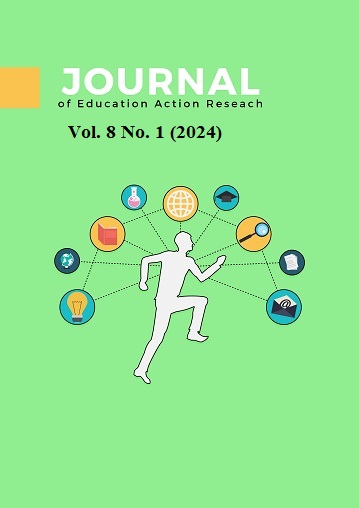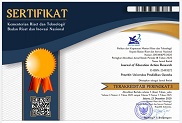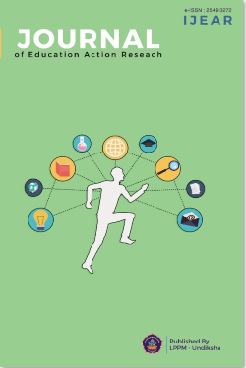Virtual Reality Integration in Geography: Meningkatkan Environmental Problem Solving Ability Siswa pada Kajian Konservasi DAS
DOI:
https://doi.org/10.23887/jear.v8i1.67943Keywords:
Virtual Reality, Pembelajaran Geografi, Environmental Problem Solving Ability, Teknologi dalam PembelajaranAbstract
Rendahnya kemampuan siswa dalam memecahkan masalah lingkungan menjadi permasalahan dalam pembelajaran geografi abad 21. Guru memerlukan upaya untuk meningkatkan kemampuan tersebut di dalam kelas melalui pembelajaran inovatif. Penelitian ini bertujuan untuk menganalisis peningkatan kemampuan pemecahan masalah lingkungan siswa melalui implementasi media Virtual Reality dalam pembelajaran geografi. Penelitian ini menggunakan metode Classroom Action Research (CAR) dengan subjek 30 siswa kelas X IPS 1 SMA. Kemampuan pemecahan masalah lingkungan diamati dalam dua siklus yang masing-masing terdiri dari empat tahapan yakni perencanaan, pelaksanaan tindakan, observasi dan refleksi. Pengumpulan data melalui observasi dan tes kemampuan pemecahan masalah mengenai permasalahan lingkungan pada materi konservasi DAS. Data primer dianalisis secara deskriptif kualitatif dengan pemaknaan secara kontekstual. Hasil penelitian menunjukkan bahwa terjadi peningkatan kemampuan pemecahan masalah lingkungan siswa sebesar 36% (memberikan rekomendasi pemecahan masalah). Oleh karena itu, guru diharapkan dapat mengintegrasikan teknologi untuk mendukung pembelajaran sehingga siswa memiliki keterampilan pemecahan masalah yang baik dalam mencari solusi permasalahan lingkungan. Guru dapat memaksimalkan pemanfaatan teknologi dalam pembelajaran geografi untuk meningkatan kemampuan pemecahan masalah lingkungan siswa agar tercipta outcome lulusan mata pelajaran geografi yang berkualitas.
References
Al-khateeb, M. A. (2018). The Effect of Teaching Mathematical Problems Solving Through Using Mobile Learning on the Seventh Grade Students ’ Ability to Solve them in Jordan. International Association of Online Engineering, 12(3), 178–191. https://www.learntechlib.org/p/209792/.
Albus, P., Vogt, A., & Seufert, T. (2021). Signaling in virtual reality influences learning outcomes and cognitive load. Computers and Education, 166, 1–16. https://doi.org/10.1016/j.compedu.2021.104154.
Amin, S., Utaya, S., Bachri, S., Sumarmi, & Susilo, S. (2020). Effect of problem-based learning on critical thinking skills and environmental attitude. Journal for the Education of Gifted Young Scientists, 8(2), 743–755. https://doi.org/10.17478/jegys.650344.
Anugrah, D., Sofyan, D. A., & Murwitaningsih, S. (2020). Model Pembelajaran Kreatif Treffinger terhadap Kemampuan Memecahkan Masalah pada Materi Ekosistem dan Perubahan Lingkungan. JPBIO: Jurnal Pendidikan Biologi, 5(1), 73–79. https://doi.org/10.31932/jpbio.v5i1.601.
Araia-Alba, P., Keane, T., Chen, W. S., & Kaufman, J. (2021). Immersive Virtual Reality as a Tool to Learn Problem-Solving Skills. Computers & Education, 164, 1–33. https://doi.org/10.1016/j.compedu.2020.104121.
Atmojo, W. T., Suroso, P., & Rahmah, S. (2022). Pembelajaran Seni Budaya Dengan Menggunakan Media Virtual Reality (Vr) Pada Tingkat Satuan Sma Berbasis Local Wisdom Sumatera Utara. Gondang: Jurnal Seni Dan Budaya, 6(1), 182. https://doi.org/10.24114/gondang.v6i1.35852.
Bagus, I., & Astawa, M. (2022). Peningkatan Spatial Thinking Pembelajaran Geografi melalui Berpendekatan Kontekstual Skills Siswa dalam Metode Demonstrasi. Journal of Education Action Research, 6(2), 242–251. https://doi.org/10.23887/jear.v6i2.45526.
Boca, G. D., & Saraçlı, S. (2019). Environmental Education and Student ’ s Perception , for Sustainability. Sustainability, 11(6), 1–18. https://doi.org/10.3390/su11061553.
Chawla, L. (2020). Childhood nature connection and constructive hope : A review of research on connecting with nature and coping with environmental loss. People and Nature, 2(3), 619–642. https://doi.org/10.1002/pan3.10128.
Debrah, J. K., Vidal, D. G., & Dinis, M. A. P. (2021). Raising Awareness on Solid Waste Management through Formal Education for Sustainability : A Developing Countries. Recycling, 6(1), 1–21. https://doi.org/10.3390/recycling6010006.
Dewi, K., Sumarmi, S., & Putra, A. K. (2021). Pengembangan Bahan Ajar Digital Berbasis STEM dengan Pendekatan Eco-Spatial Behavior Materi Kependudukan. J-PIPS (Jurnal Pendidikan Ilmu Pengetahuan Sosial), 7(2), 93–103. https://doi.org/10.18860/jpips.v7i2.11960.
Dolphin, G., Dutchak, A., Karchewski, B., & Cooper, J. (2019). Virtual Field Experiences in Introductory Geology: Addressing a Capacity Problem, but Finding a Pedagogical One. Journal of Geoscience Education, 67(2), 114–130. https://doi.org/10.1080/10899995.2018.1547034.
Firmansyah, R. I., Aditya, A., & Kartikasari, M. (2021). Game Edukasi Sistem Tata Surya Bagi Siswa Sekolah Dasar Berbasis Virtual Reality. Jurnal Simantec, 9(2), 39–44. https://doi.org/10.21107/simantec.v9i2.9912.
Guo, F., Lane, J., Duan, Y., Stoltman, J. P., & Khlebosolova, O. (2018). Sustainable Development in Geography Education for Middle School in China. Sustainability, 10(11), 1–27. https://doi.org/10.3390/su10113896.
Gusnia, N. E. (2022). Pengembangan Media Kanoraya dalam Pembelajaran Subtema Keberagaman Budaya Bangsaku Kelas 4 SDN Karangtengah 4 Ngawi. Jurnal Pendidikan Guru Sekolah Dasar, 10(4), 843–854.
Hasnah, N. (2023). Pengembangan Keterampilan Abad Ke-21 Dalam Pembelajaran Geografi. Nanggroe: Jurnal Pengabdian Cendikia, 2(3), 177–183. https://doi.org/10.36418/japendi.v2i4.150.
Herz, M., & Rauschnabel, P. A. (2019). Understanding the diffusion of virtual reality glasses : The role of media, fashion and technology. Technological Forecasting & Social Change, 138, 228–242. https://doi.org/10.1016/j.techfore.2018.09.008.
Hindiyati, K., Wirahayu, Y. A., Astina, I. K., & Soekamto, H. (2022). Pengaruh model pembelajaran Problem Based Learning (PBL) berbantuan media animasi terhadap kemampuan memecahkan masalah Geografi siswa. Jurnal Integrasi Dan Harmoni Inovatif Ilmu-Ilmu Sosial (JIHI3S), 2(12), 1249–1259. https://doi.org/10.17977/um063v2i12p1249-1259.
Huang, X., Zou, D., Cheng, G., & Xie, H. (2021). A Systematic Review of AR and VR Enhanced Language Learning. Sustainability (Switzerland), 13(9), 1–28. https://doi.org/10.3390/su13094639.
Immaniar, B. D., Sumarmi, S., & Astina, I. K. (2019). Pembelajaran Lingkungan Berbasis Kearifan Lokal dengan Model Experiential Learning. Jurnal Pendidikan: Teori, Penelitian, Dan Pengembangan, 4(5), 648. https://doi.org/10.17977/jptpp.v4i5.12431.
Indriana, A., Yusuf, M., Maru, R., & Saputro, A. (2021). Efektivitas Discovery Learning pada Pembelajaran Geografi untuk mengurangi Miskonsepsi Peserta Didik. LaGeografia, 19(3), 284–301. https://doi.org/10.35580/lageografia.v19i3.14718.
Islam, M. N., Sumarmi, S., Putra, A. K., Sugiyati, P., & Salsabilah, S. (2021). The Effect of Interactive Blended-Problem Based Learning Assisted Virtual Classroom on Critical Thinking Skills of Students of The Society Era 5.0. Jurnal Geografi Gea, 21(2), 135–146. https://doi.org/10.17509/gea.v21i2.38862.
Jensen, L., & Konradsen, F. (2018). A review of the use of virtual reality head-mounted displays in education and training. Education and Information Technologies, 23(4), 1515–1529. https://doi.org/10.1007/s10639-017-9676-0.
Juan, M. C., García-García, I., Mollá, R., & López, R. (2018). Users’ perceptions using low-end and high-end mobile-rendered HMDs: A comparative study. Computers, 7(15), 1–17. https://doi.org/10.3390/computers7010015.
Jumrawarsi, & Suhaili, N. (2020). Peran Seorang Guru dalam Menciptakan Lingkungan Belajar yang Kondusif. Ensiklopedia Education Review, 2(3), 50–54. https://doi.org/10.33559/eer.v2i3.628.
Kamil, P. A., Utaya, S., & Utomo, D. H. (2019). Improving disaster knowledge within high school students through geographic literacy. International Journal of Disaster Risk Reduction, 43, 1–16. https://doi.org/10.1016/j.ijdrr.2019.101411.
Khairunnisa, K., Saadi, P., & Leny, L. (2022). Implementasi Model Problem Based Learning Berbasis Stem Dengan Media Virtual Reality Terhadap Kemampuan Berpikir Kritis Dan Self Regulation Peserta Didik. Quantum: Jurnal Inovasi Pendidikan Sains, 13(1), 96. https://doi.org/10.20527/quantum.v13i1.12109.
Kim, H., So, H., & Park, J. (2022). Examining the Effect of Socially Engaged Art Education with Virtual Reality on Creative Problem Solving. Journal of Educational Technology & Society, 25(2), 117–129. https://www.jstor.org/stable/48660128.
Kneale, P. E. (2019). Study Skills for Geography Earth and Environmental Science Students. In Routledge. https://doi.org/10.4324/9780203772928.
Kusumaningrum, D. (2020). Pengembangan Environmental Literacy Instrument Ranah Kognitif Untuk Siswa Sekolah Dasar di Kabupaten Malang. JPDI (Jurnal Pendidikan Dasar Indonesia), 5(2), 45–51. https://doi.org/10.26737/jpdi.v5i2.2204.
Leksono, S. M., Dini, S. N., & Ekanara, B. (2020). Pengaruh Pembelajaran Proyek Mini Riset Terhadap Kemampuan Menganalisis Permasalahan Konservasi Lingkungan. Biodidaktika: Jurnal Biologi Dan Pembelajarannya, 15(1), 70–77. https://doi.org/10.30870/biodidaktika.v15i1.8203.
Lian, B., & Amiruddin. (2021). Manajemen Pembelajaran Inovatif Di Era Disruptif. Prosiding Seminar Nasional Program Pascasarjana Universitas Pgri Palembang, 1–6. https://jurnal.univpgri-palembang.ac.id/index.php/Prosidingpps/index.
Lubis, A. N., & Dewi, I. (2023). Penerapan Problem-Based Learning Berbantuan Edmodo untuk Meningkatkan Kemampuan Komunikasi Matematis Siswa Kelas XI di SMA Negeri 11 Medan T.A. 2022/2023. Jurnal Cendekia : Jurnal Pendidikan Matematika, 7(1), 562–579. https://doi.org/10.31004/cendekia.v7i1.2067.
Makransky, G., Borre-Gude, S., & Mayer, R. E. (2019). Motivational and cognitive benefits of training in immersive virtual reality based on multiple assessments. Journal of Computer Assisted Learning, 35(6), 691–707. https://doi.org/10.1111/jcal.12375.
Maulana, I. (2022). Virtual Reality Tour Menggunakan Metode Gambar Panorama Sebagai Media Pengenalan Lingkungan Sekolah Smk Khiara Ummah. Media Aplikom, 14(2), 84–99. https://doi.org/10.33488/1.ma.2.2.347.
Meyer, O. A., Omdahl, M. K., & Makransky, G. (2019). Investigating the effect of pre-training when learning through immersive virtual reality and video: A media and methods experiment. Computers and Education, 140, 1–17. https://doi.org/10.1016/j.compedu.2019.103603.
Musyadad, V. F., Supriatna, A., & Parsa, S. M. (2019). Penerapan Model Pembelajaran Problem Based Learning dalam Meningkatkan Hasil Belajar Siswa pada Pelajaran IPA pada Konsep Perubahan Lingkungan Fisik dan Pengaruhnya terhadap Daratan. Jurnal Tahsinia, 1(1), 1–13. https://doi.org/10.57171/jt.v1i1.13.
Nahriyah, A. S., & Rachmadiarti, F. (2023). Pengembangan E-Book Berbasis Problem Based Learning pada Materi Perubahan Lingkungan untuk Melatihkan Kemampuan Berpikir Kritis Siswa Kelas SMA. BioEdu: Berkala Ilmiah Pendidikan Biologi, 12(2), 321–342. https://doi.org/10.26740/bioedu.v12n2.p321-342.
Nurjannah, H., Saputro, A., Maddatuang, M., & Fikri, M. J. N. (2020). Penerapan Model Pembelajaran Treffinger Pada Pembelajaran Geografi. LaGeografia, 19(1), 113–127. https://doi.org/10.35580/lageografia.v19i1.13608.
Olmos, E., Cavalcanti, J. F., Soler, J.-L., Contero, M., & Alcañiz, M. (2018). Mobile Virtual Reality: A Promising Technology to Change the Way We Learn and Teach. Mobile and Ubiquitous Learning: An International Handbook, 95–106. https://doi.org/10.1007/978-981-10-6144-8_6.
Pirker, J., & Dengel, A. (2021). The Potential of 360-Degree Virtual Reality Videos and Real VR for Education - A Literature Review. IEEE Computer Graphics and Applications, 41(4), 76–89. https://doi.org/10.1109/MCG.2021.3067999.
Prastiwi, L., Sigit, D. V, & Ristanto, R. H. (2019). Relationship Between Academic Ability and Environmental Problem-Solving Skill : A Case Study at Adiwiyata Schools in Tangerang City , Indonesia Relationship Between Academic Ability and Environmental Problem- Solving Skill. Üniversitepark Bülten, 8(1), 76–86. https://doi.org/10.22521/unibulletin.2019.81.6.
Primayana, K. H., Lasmawan, W. I., & Adnyana, P. B. (2019). Pengaruh Model Pembelajaran Kontekstual Berbasis Lingkungan Terhadap Hasil Belajar IPA Ditinjau Dari Minat Outdoor Pada Siswa Kelas IV. Jurnal Pendidikan Dan Pembelajaran IPA Indonesia, 9(2), 72–79. http://ejournal-pasca.undiksha.ac.id/index.php/jurnal_ipa/index.
Putra, A. K., Purwanto, Islam, M. N., Hidayat, W. N., & Fahmi, M. R. (2022). Development of Mobile Virtual Field Trips in Ijen Crater Geosites Based on 3600 Auto Stereoscopic and Geospatial Technology As Geography Learning Media. Geojournal of Tourism and Geosites, 41(2), 456–463. https://doi.org/10.30892/GTG.41216-850.
Putra, D. A., Utama, S. P., & Mersyah, R. (2019). Pengelolaan Sumbedaya Alam Berbasis Masyarakat dalam Upaya Konservasi Daerah Aliran Sungai Lubuk Langkap Desa Suka maju Kecamatan Air Nipis Kabupaten Bengkulu Selatan. Naturalis: Jurnal Penelitian Pengelolaan Sumber Daya Alam Dan Lingkungan, 8(2), 77–86. https://doi.org/10.31186/naturalis.8.2.9211.
Radianti, J., Majchrzak, T. A., Fromm, J., & Wohlgenannt, I. (2020). A systematic review of immersive virtual reality applications for higher education: Design elements, lessons learned, and research agenda. Computers and Education, 147, 103778. https://doi.org/10.1016/j.compedu.2019.103778.
Ramadhan, S., Sukma, E., & Indriyani, V. (2019). Environmental education and disaster mitigation through language learning Environmental education and disaster mitigation through language learning. IOP Conference Series: Earth and Environmental Science, 314(1), 012054. https://doi.org/10.1088/1755-1315/314/1/012054.
Rashidov, A. S. (2022). Using of Problem Educational Technologies in the Development of Students’ Creative and Logical Thinking Skills. Berlin Studies Transnational Journal of Science and Humanities, 2(1), 262–274. https://doi.org/10.5281/zenodo.6431171.
Ridhwan, Sumarmi, Ruja, I. N., Utomo, D. H., & Sari, R. M. (2020). Measuring students environmental problem solving ability across gender and school differences using paper based testing. International Journal of Emerging Technologies in Learning, 15(13), 303–320. https://doi.org/10.3991/ijet.v15i13.11709.
Rizal, A., Yusup, D., & Voutama, A. (2020). Evaluasi Faktor Manfaat Sistem Lingkungan Pembelajaran 3 Dimensi Berbasis Multi-User Virtual Reality (MuVR). Jurnal Teknologi Informasi Dan Ilmu Komputer (JTIIK), 7(5), 895–904. https://doi.org/10.25126/jtiik.2020752215.
Rosa, C. D., & Collado, S. (2019). Experiences in Nature and Environmental Attitudes and Behaviors : Setting the Ground for Future Research. Frontiers in Psychology, 10, 1–9. https://doi.org/10.3389/fpsyg.2019.00763.
Sabila, B. A., Priyambodo, D., & Azzalea, G. D. (2023). Implementasi Kebijakan Pemerintah Dalam Pengelolaan Daerah Aliran Sungai Terhadap Aktivitas Alih Fungsi Lahan. Jurnal Reformasi Hukum, 27(1), 370. https://doi.org/10.46257/jrh.v27i1.497.
Salsabila, T. I., Putra, A. K., & Matos, T. (2022). Mobile Virtual Field Trip and Geography Education: Potential Exploration of Complex Problem Solving and Spatial Intelligence Capabilities. International Journal of Interactive Mobile Technologies, 16(24), 21–31. https://doi.org/10.3991/ijim.v16i24.36157.
Setyawan, M. D., Hakim, L. El, & Aziz, T. A. (2023). Kajian Peran Virtual Reality (VR) untuk Membangun Kemampuan Dialogis Siswa dalam Pembelajaran Matematika. Jurnal Pendidikan Indonesia, 4(2), 122–131. https://doi.org/10.59141/japendi.v4i02.1592.
Sholihin, M., Sari, R. C., Yuniarti, N., & Ilyana, S. (2020). A new way of teaching business ethics: The evaluation of virtual reality-based learning media. International Journal of Management Education, 18(3), 100428. https://doi.org/10.1016/j.ijme.2020.100428.
Siregar, Z., & Marpaung, T. B. (2020). Pemanfaatan Teknologi Informasi dan Komunikasi (TIK) Dalam Pembelajaran di Sekolah. BEST Journal (Biology Education, Sains and Technology), 3(1), 61–69. https://doi.org/10.30743/best.v3i1.2437.
Su, C. H. (2018). Exploring sustainability environment educational design and learning effect evaluation through migration theory: An example of environment educational serious games. Sustainability (Switzerland), 10(10), 3363. https://doi.org/10.3390/su10103363.
Suhartono, S., Mutiani, M., Rahman, A. M., Putra, M. A. H., & Murniasih, C. (2023). Peningkatan Kecerdasan Ekologis Siswa SD melalui Komik Edukasi Berbasis Kearifan Lokal sebagai Sumber Belajar (Studi Etnosains Masyarakat Banjar dan Baduy). Journal on Education, 5(3), 10441–10455. https://www.jonedu.org/index.php/joe/article/view/1946
Sun, Z., Xie, K., & Anderman, L. H. (2018). The role of self-regulated learning in students’ success in flipped undergraduate math courses. Internet and Higher Education, 36, 41–53. https://doi.org/10.1016/j.iheduc.2017.09.003.
Syafril, R. S., Redo Hervando, A., & Jovan, A. (2020). Penerapan Sederhana Virtual Reality dalam Presentasi Arsitektur. Jurnal Arsitektur NALARs, 19(1), 29–40. https://doi.org/10.24853/nalars.19.1.29-40.
Taub, M., Sawyer, R., Smith, A., Rowe, J., Azevedo, R., & Lester, J. (2020). Computers & Education The agency effect : The impact of student agency on learning , emotions , and problem-solving behaviors in a game-based learning environment. Computers & Education, 147, 1037881. https://doi.org/10.1016/j.compedu.2019.103781.
Thuan, H., Saurik, T., Purwanto, D. D., & Hadikusuma, J. I. (2019). Virtual Reality Technology for Campus Media Information. 6(1), 71–76. https://doi.org/10.25126/jtiik.201961238.
Tompodung, T. C. G., Rushayati, S. B., & Aidi, M. N. (2018). Efektivitas Program Adiwiyata Terhadap Perilaku Ramah Lingkungan Warga Sekolah Di Kota Depok. Jurnal Pengelolaan Sumberdaya Alam Dan Lingkungan (Journal of Natural Resources and Environmental Management), 8(2), 170–177. https://doi.org/10.29244/jpsl.8.2.170-177.
Turohmah, F. D. A., Putra, A. K., & Suharto, Y. (2021). Improving Critical Thinking Ability: Earthcomm Learning For Watershed Conservation Materials. IJIS Edu : Indonesian Journal of Integrated Science Education, 3(2), 99. https://doi.org/10.29300/ijisedu.v3i2.4336.
Wahab, A., Sari, A. R., Zuana, M. M. M., Luturmas, Y., & Kuncoro, B. (2022). Penguatan Pendidikan Karakter Melalui Literasi Digital Sebagai Strategi Dalam Menuju Pembelajaran Imersif Era 4.0. Jurnal Pendidikan Dan Konseling, 4(5), 4644–4653. https://doi.org/10.31004/jpdk.v4i5.7373.
Wu, B., Yu, X., & Gu, X. (2020). Effectiveness of immersive virtual reality using head-mounted displays on learning performance: A meta-analysis. British Journal of Educational Technology, 51(6), 1991–2005. https://doi.org/10.1111/bjet.13023.
Downloads
Published
How to Cite
Issue
Section
License
Copyright (c) 2023 Nurul Afifah, Alfyananda Kurnia Putra, Alan Hibatul Haqqi

This work is licensed under a Creative Commons Attribution-ShareAlike 4.0 International License.












